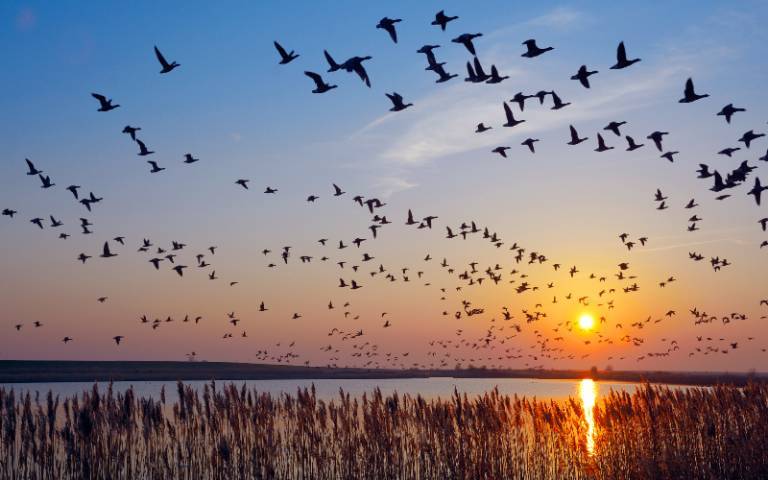Human activity responsible for mass bird extinctions
22 December 2023
Humans have wiped out around 1,400 bird species – twice as many as previously thought – with major implications for the ongoing biodiversity crisis, a new study involving UCL researchers has found.

Many of the world’s islands were previously untouched paradises, but the arrival of people to places like Hawaii, Tonga and the Azores led to far-reaching impacts including deforestation, overhunting and the introduction of invasive species. Consequently, bird species were wiped out.
While the demise of many birds since the 1500s has been recorded, our knowledge of the fate of certain species before this relies on fossils, and these records are limited because birds’ lightweight bones disintegrate over time.
Researchers now believe that 1,430 bird species – almost 12 per cent – have died out over modern human history, since the Late Pleistocene around 130,000 years ago, with the vast majority of them becoming extinct directly or indirectly due to human activity.
The study, led by the UK Centre for Ecology & Hydrology (UKCEH) and published in Nature Communications, used statistical modelling to estimate the undiscovered bird extinctions.
Lead author Dr Rob Cooke, an ecological modeller at UKCEH, says: “Our study demonstrates there has been a far higher human impact on avian diversity than previously recognised. Humans have rapidly devastated bird populations via habitat loss, overexploitation and the introduction of rats, pigs and dogs that raided nests of birds and competed with them for food. We show that many species became extinct before written records and left no trace, lost from history.”
Co-author of the study, Professor Tim Blackburn (UCL Biosciences), added: “It’s shocking to think that human activities have already been responsible for the extinction of more than 1,400 species. That’s one in every eight bird species already gone.
“It’s even more shocking that one in eight extant bird species is currently threatened with extinction. We need to heed these literal canaries in the coal mine and take our collective responsibility for the health of our planet much more seriously.”
Observations and fossils show 640 bird species have been driven extinct since the Late Pleistocene period – 90 per cent of these on islands inhabited by people. These range from the iconic Dodo of Mauritius to the Great Auk of the North Atlantic to the lesser-known Saint Helena Giant Hoopoe.
But researchers have estimated the actual figure is just over double that –1,430 lost species – leaving just under 11,000 today. Dr Cooke says it is likely that only around 50 of these species would have died out naturally.
The scientists say their study has uncovered the largest human-driven vertebrate extinction event in history, during the 14th century, estimating that 570 bird species were lost after people first arrived in the Eastern Pacific, including Hawaii and the Cook Islands – nearly 100 times the natural extinction rate.
They believe there was also a major extinction event in the ninth century BC, primarily driven by the arrival of people to the Western Pacific, including Fiji and the Mariana Islands, as well as the Canary Islands, and highlight the ongoing extinction event, which started in the mid-18th century. Since then, in addition to an increase in deforestation and the spread of invasive species, birds have faced the additional human-driven threats of climate change, intensive agriculture and pollution.
Dr Søren Faurby of the University of Gothenburg, another study co-author, said: “These historic extinctions have major implications for the current biodiversity crisis.
“The world may not only have lost many fascinating birds but also their varied ecological roles, which are likely to have included key functions such as seed dispersal and pollination. This will have had cascading harmful effects on ecosystems so, in addition to bird extinctions, we will have lost a lot of plants and animals that depended on these species for survival.”
Previous research by the authors suggests we are at risk of losing up to 700 additional bird species in the next few hundred years, which would be an unprecedented human-driven decimation of species.
The study team based their modelled estimates on known extinctions and the extent of relevant research effort in regions compared to New Zealand. The country is the only place in the world where the pre-human bird fauna is believed to be completely known, with well-preserved remains of all birds there. The fewer studies in a region, the more incomplete the fossil record is expected to be, and the greater the number of estimated undiscovered extinctions.
Links
- Research paper in Nature Communications
- Professor Tim Blackburn's academic profile
- UCL Genetics, Evolution & Environment
- UCL Biosciences
- UK Centre for Ecology & Hydrology
- University of Gothenburg
Image
- Credit: eurotravel (iStock)
 Close
Close

